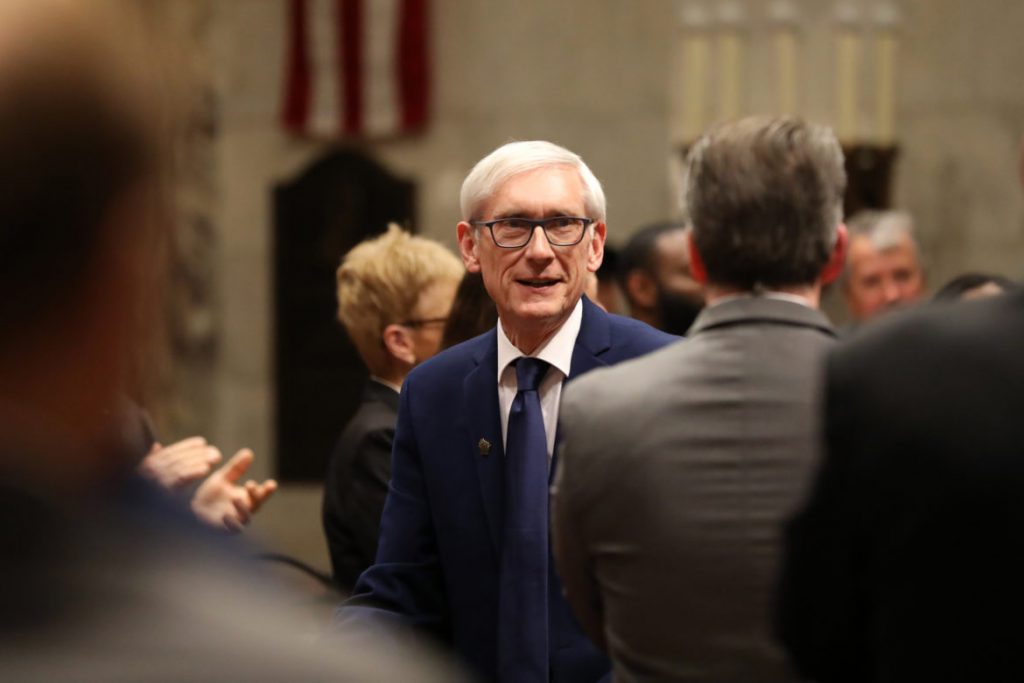Tax Cut Divides Democrats
Evers and some Democratic legislators supported it. GOP hopes to gain new seats from swing-district opponents.
The Republican-crafted 2021-23 state budget — with a $2.3-billion income tax cut and $574 million to control property taxes — split the state’s Democrats in interesting ways.
Democratic Gov. Tony Evers signed the budget into law. Three of the 12 Democratic senators, and four of the 38 Assembly Democrats, voted for the Republicans’ budget. They were the first bipartisan budget votes in 14 years.
Of Democrats who voted for the budget, six of them won their seats with victory margins of 52% or less, and six will be up for re-election in 16 months.
When Democratic legislators publicly condemned the GOP budget, they said they hoped Evers could rewrite it with vetoes. He didn’t; 48 of his 50 vetoes changed minor provisions in the Republicans’ spending plan.
His two vetoes of consequence — delaying a $550-million payment from state government’s checking account to the rainy fund and killing new paycheck withholding tables to reflect the income tax cut — provided no political cover from Democrats who had to decide whether or not to vote for their opponents’ budget.
Republicans said Evers, up for re-election next year, had no choice but to sign their budget. Evers “got boxed into a corner and, rather than fight for his unpopular [February] budget and risk a political knockout, he and his team threw in the towel and signed our responsible budget,” said Senate Majority Leader Devin LeMahieu.
Let’s break the 50 Democratic legislators into four categories.
1. Democrats who voted for the budget.
They include Senate Democratic Leader Janet Bewley, of Mason, who was elected in 2018 with 51% of the vote. She was joined by Democratic Sens. Brad Pfaff, of La Crosse, who got 50.3% of the vote last November, and Jeff Smith, of Eau Claire, whose 2018 winning margin was 51.6%.
In the Assembly, voting for the budget was first-term Democratic Rep. Deb Andraca, of Whitefish Bay, who won with 51.6% of the vote last year. She was joined by Beth Meyers, of Bayfield, who got 51.4% of the vote; Steve Doyle, of Onalaska, 52.4%, and Don Vruwink of Milton, 55.3%
Andraca and Smith got photo-op bonuses for their votes when the governor came to their districts to sign the Republicans’ budget.
2. Democrats who voted “no” who had close races last November.
Four Assembly Democrats won with less than 55% of the vote, so Republicans consider them vulnerable over their budget votes. They are first-term Rep. Sara Rodriguez, of Brookfield, whose winning margin was 50.7%; Nick Milroy, of Superior, 50.2%; and Robyn Vining, of Wauwatosa, and Democratic Leader Gordon Hintz, of Oshkosh, who both got 54% of the vote.
3. Democrats who voted “no” who won with margins of more than 55%.
Two Democratic senators — LaTonya Johnson, of Milwaukee, and Melissa Agard, of Madison — and 24 Assembly Democrats who had Republican challengers last November won with margins that ranged up to 88%.
4. Democrats who voted “no” who ran unopposed or had only third-party challengers. Ten Democrats – three in the Senate and seven in the Assembly – from safe seats in Milwaukee or Madison had no major-party opponents in November.
One Democrat who voted no said there was “not much communication” between the governor’s office and Democratic legislators after the Joint Finance Committee put the budget in its final form.
At one point, Evers threatened to veto the entire Republican-crafted budget. But, the Democrat added, “I don’t think a veto was seriously considered. If that was an option, [Evers] would have had to push much harder over the winter/spring…He never really drew a line in the sand.
“It’s hard to veto, if you haven’t made the public case for it beforehand.”
One of the most surprising quotes came from Bewley, who represents northwest Wisconsin and who is up for election next year, after she voted for the budget: “Some of us have to pay attention to our districts.”
Wait. Doesn’t the civics-textbook definition of a democracy say every legislator’s first obligation is paying attention to their district?
Steven Walters started covering the Capitol in 1988. Contact him at stevenscotwalters@gmail.com
If you think stories like this are important, become a member of Urban Milwaukee and help support real, independent journalism. Plus you get some cool added benefits.
The State of Politics
-
RNC Brings Fame to Gen Z Party Leader
 Jul 15th, 2024 by Steven Walters
Jul 15th, 2024 by Steven Walters
-
Wisconsin’s Republican Roots Run Deep
 Jul 8th, 2024 by Steven Walters
Jul 8th, 2024 by Steven Walters
-
Feuding Supreme Court Justices Need a Break
 Jul 1st, 2024 by Steven Walters
Jul 1st, 2024 by Steven Walters























Divide us? I think you’re mistaken. We recognized that Evers really had no choice given the negative monetary consequences of losing millions in federal $$ and political ammunition given to the WIGOP if he had vetoed it.